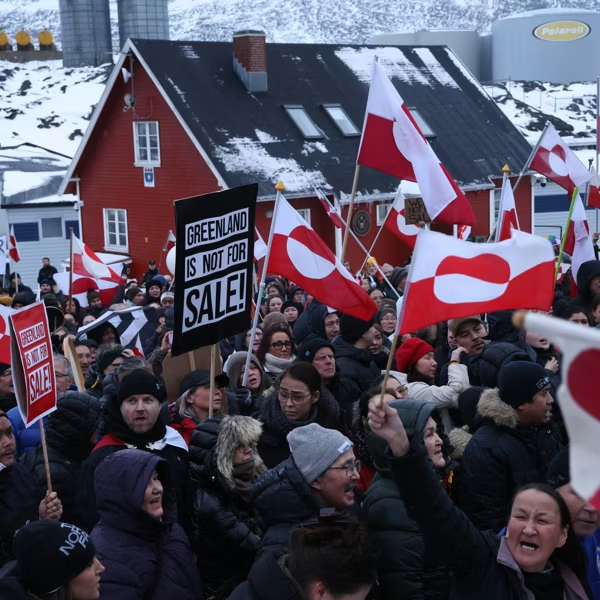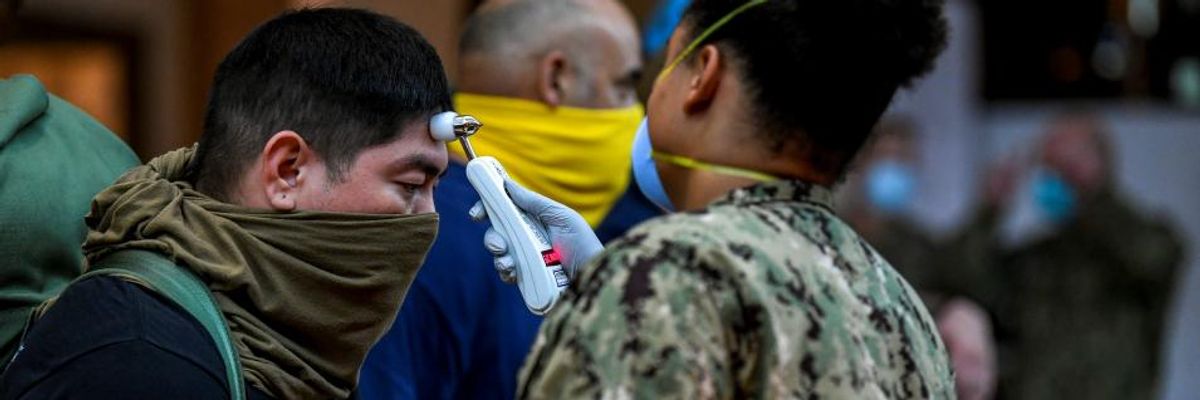Guam has always been the U.S. military's best kept secret. Military secrecy isn't really new, but in the midst of the global pandemic the Pentagon ordered bases to stop publicly announcing their coronavirus cases. By July more than 29,000 service members had contracted the coronavirus, and this summer military and public health officials declared the U.S. military a source of transmission both domestically and abroad.
Guahan--the Indigenous name for Guam--is the hardest hit place in the Pacific region by the COVID-19 outbreak, and military transmission is clear. Since March 2020, aircraft carriers from the U.S.S. Roosevelt to the U.S.S. Ronald Reagan have offloaded thousands of infected sailors--many of whom contracted the virus for a second time and broke the island's quarantine restrictions. To date, COVID-19 has infected nearly 2% of the island's population of 165,000, putting the military on island in health condition "Charlie."
The U.S. military will continue to put the people of Guahan at risk, long after the pandemic ends without a fundamental dismantling of the colonial project. After all, the military has always been a hotspot for colonial violence, destroying environments and occupying Pacific Island territories with impunity for generations. Despite the irreversible damage and desecration it inflicts, the general public is largely ignorant of its operations.
"While threats from militarism and climate vulnerability are woven into everyday life in a U.S. colony, this situation has also been met with centuries of continuous resistance."
Politically Guahan is an "unincorporated territory," a designation unilaterally imposed after the U.S. engaged in bombing campaigns and landgrabs to recapture the island from Japan in World War II--in short, a twenty-first century colony. This place may just be the best kept secret that the U.S. has--a nearly forgotten island in Micronesia where the military conducts training and testing that it would never have attempted in the contiguous states.
In 2020, the military continues to occupy nearly one-third of this westernmost U.S. territory in the Pacific. Andersen Airforce Base and Naval Base Guam are two major military bases that host bombers, serve as a home port to nuclear-powered fast attack submarines, maintain huge munitions and fuel storage facilities, maintain a helicopter squadron, operate a Terminal High Altitude Area Defense (THAAD) ballistic missile interceptor, and provide U.S. security forces to support the Department of Defense's military strategy in the Asia-Pacific region. The U.S. is also implementing plans to further inundate the island's existing military troop presence by relocating an additional 5,000 U.S. Marines from Okinawa to Guam. These elements of militarism are largely normalized as insuring security and protection, yet research reveals that it is the U.S. military presence which makes the island a target for attacks and threats ranging from missiles to climate change.
As the largest global force, the U.S. military is the single biggest consumer of fossil fuels, largest producer of greenhouse gases (GHGs), and single entity most responsible for destabilizing the Earth's climate. The Department of Defense is the greatest polluter worldwide with a continuous record of destroying environments and generating massive amounts of hazardous waste for its routine operations. Military expansion as well as the operation of bases exacerbate our shared climate emergency. Dispossession and environmental destruction from militarization demonstrates the overwhelming costs of U.S. empire--particularly among Indigenous communities throughout the Pacific and Indian country. Among the legacy of violence is racism, which existed long before Senate panel efforts to remove confederate namesakes from military bases.
While threats from militarism and climate vulnerability are woven into everyday life in a U.S. colony, this situation has also been met with centuries of continuous resistance. With a ceaseless movement for self-determination, Guahan and its Indigenous Chamoru people continue to challenge the narrative that the island and its surrounding waters are merely a strategic military base for the U.S. to destroy with its Pacific bombing ranges.
As Chamoru scholar Dr. Kenneth Gofigan Kuper explains, living "at the tip of the American military's spear" means living with militarization that is "responsible for environmental contamination, with toxic chemicals and heavy metals sludging through the island's arteries" and though the country is quickly approaching the U.S. Presidential election in November, Guahan has "no vote in the Electoral College, no representation in the U.S. Senate, only non-voting representation in the House of Representatives, and are under the 'plenary' -- or complete -- power of Congress."
While civic engagement and voting rights are important, U.S. colonization and militarization are constant threats to political power for the people of Guahan. Until the island exercises its inherent right to self-determination and the island chooses its own political future, decisions on everything from public health to climate action and the economy will be continuously deferred to external powers. The impacts of these injustices are clear in the midst of surging COVID-19 cases and deaths as the military continues its construction of a live-fire training range on sacred land in Guahan and executes "war games" like RIMPAC throughout the Pacific.
Though Guahan floats on the other side of the world, every sector of civil society is implicated in the military war machine--from pension funds and university endowments to your state and local municipalities--public and private assets are entangled up with military contractors, weapons manufacturers, and war. Such profiteering is largely normalized today. From public to private assets, every part of the "American" experience has profited from colonial control in the Pacific. Yet, divesting these dollars from destructive weapons and war could mean reinvesting in what the pandemic has revealed we all so desperately need--genuine security in public health, education, housing, food, green jobs and a just transition from fossil fuels. As the protests against anti-Black racism continue in cities like Kenosha, Portland, Oakland, Chicago and Philadelphia--rethinking and defunding the police also means divesting from the military industry that structures all our lives.
Centuries of continuous colonization are not Guahan's defining story, and neither is the COVID-19 pandemic exacerbated by the U.S. military's exceptionalism. The people of Guahan deserve even more than a symbolic change to military base names--they deserve an end to colonial violence.




